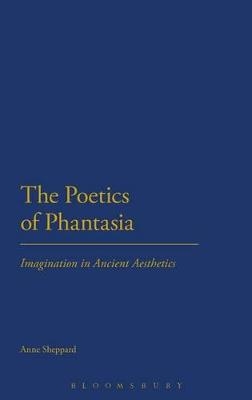
The Poetics of Phantasia
Bloomsbury Academic (Verlag)
978-1-4725-0765-5 (ISBN)
The Greeks and Romans tended to think of the production of works of art in terms of imitation, either of the world around us or of a transcendent ideal world, rather than in terms of originality and creativity. Study of the way phantasia is used in ancient writing about literature and art reveals important features of the ancient approach to the arts and in doing so will also shed light on modern concepts of imagination and the literary and artistic differences between realism and allegory.
Covering a range of literary and philosophical material from the beginnings of Greek literature down to the Neoplatonist philosophers of late antiquity, The Poetics of Phantasia discusses three discrete senses of imagination in ancient thought. Firstly, phantasia as visualization is explored: when a writer 'brings before his eyes' what he is describing and enables his audience or reader to visualise it likewise. The second theory of phantasia is that which is capable not only of conveying images from sense-perception but also of receiving images from intellectual and supra-intellectual faculties in the soul, and thus helping people grasp mathematical, metaphysical or even mystical concepts. Finally, phantasia is seen as a creative power which can conjure up an image that points beyond itself and to express ideas outside our everyday experience.
Anne Sheppard is Professor of Ancient Philosophy, Royal Holloway, University of London, UK. Her publications include Studies on the 5th and 6th essays of Proclus’ Commentary on the Republic (Hypomnemata 61. Göttingen 1980); Aesthetics. An introduction to the philosophy of art (Oxford 1987) and Greek and Roman Aesthetics (Cambridge Texts in the History of Philosophy. Cambridge 2010). Her co-edited works include Ancient Approaches to Plato’s Timaeus (London 2003), Studies on Porphyry (London 2007), Aristotle and the Stoics reading Plato (London 2010) and Ancient Approaches to Plato’s Republic (forthcoming, London 2013).
Preface
Introduction: Aristotle’s phantasia and the ancient concept of imagination
Timeline
Chapter 1: Visualization, vividness (enargeia) and realism
Chapter 2: Mathematical projection, copying and analogy
Chapter 3: Prophecy, inspiration and allegory
Conclusion: Ancient and modern imagination
Bibliography
Index
| Erscheint lt. Verlag | 13.3.2014 |
|---|---|
| Verlagsort | London |
| Sprache | englisch |
| Maße | 156 x 234 mm |
| Gewicht | 376 g |
| Themenwelt | Geisteswissenschaften ► Philosophie ► Philosophie Altertum / Antike |
| ISBN-10 | 1-4725-0765-7 / 1472507657 |
| ISBN-13 | 978-1-4725-0765-5 / 9781472507655 |
| Zustand | Neuware |
| Haben Sie eine Frage zum Produkt? |
aus dem Bereich


